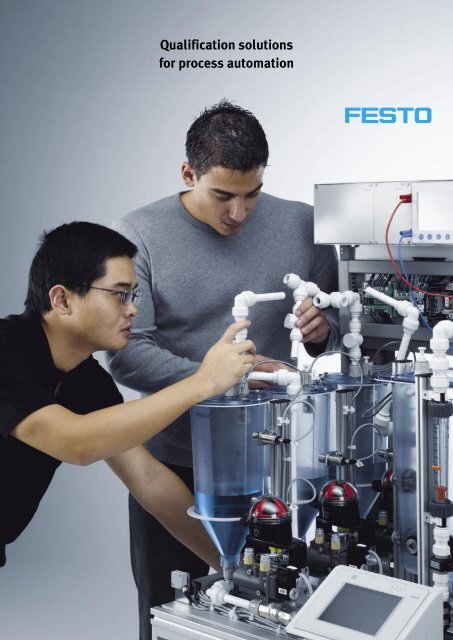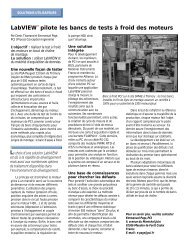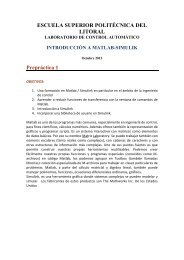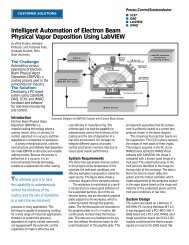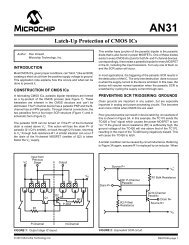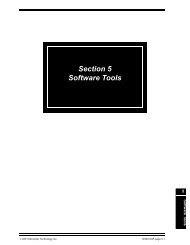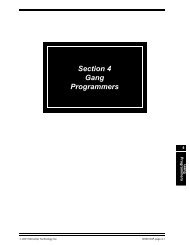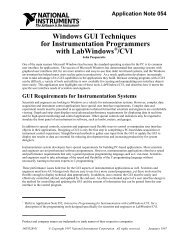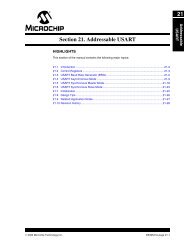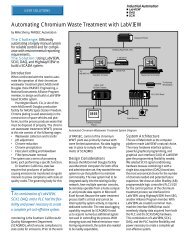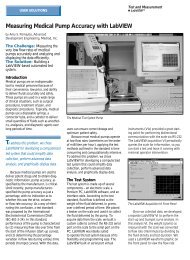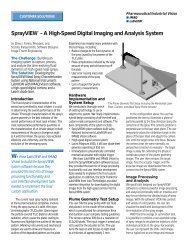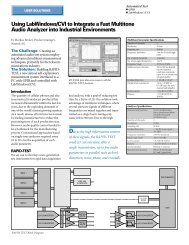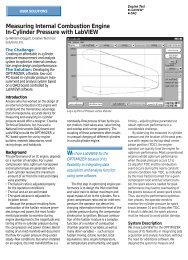Qualification solutions for process automation
Qualification solutions for process automation
Qualification solutions for process automation
Create successful ePaper yourself
Turn your PDF publications into a flip-book with our unique Google optimized e-Paper software.
<strong>Qualification</strong> <strong>solutions</strong><br />
<strong>for</strong> <strong>process</strong> <strong>automation</strong>
Process <strong>automation</strong><br />
Professional, industry-focused qualification <strong>solutions</strong><br />
<strong>for</strong> <strong>process</strong> <strong>automation</strong><br />
MPS ® PA<br />
The new learning system <strong>for</strong><br />
<strong>process</strong> <strong>automation</strong><br />
Filtering, mixing, tempering and<br />
filling as in industry<br />
Networked system<br />
With 3 or 4 stations<br />
Measurement and control of level,<br />
flow rate, pressure and temperature<br />
Compact Workstation<br />
Measurement and control of level,<br />
flow rate, pressure and temperature<br />
2 Worldwide at your fingertips. Find your contact person at: www.festo-didactic.com
Process <strong>automation</strong><br />
Challenging – The <strong>process</strong> industry<br />
Few industries have as many facets<br />
or are as interesting as the <strong>process</strong><br />
industry, which produces a wide<br />
range of products <strong>for</strong> the most diverse<br />
areas of daily life.<br />
On the one hand, the chemical industry<br />
produces preliminary products<br />
<strong>for</strong> other industries. This group includes<br />
base chemicals, petrochemicals,<br />
polymers as well as refined and<br />
special chemicals. Key consumers include<br />
the automotive, packaging and<br />
building industries.<br />
Even though the end products may<br />
differ, <strong>automation</strong> is making huge<br />
leaps <strong>for</strong>ward in each of these areas.<br />
International competition and<br />
the resultant pressure to continually<br />
increase productivity as well as<br />
a continuously expanding range of<br />
variants and strict requirements <strong>for</strong><br />
<strong>process</strong> and quality assurance demand<br />
<strong>automation</strong> <strong>solutions</strong>.<br />
On the other hand, chemical products<br />
are used in the areas of health,<br />
the environment and nutrition. As<br />
well as the chemical and pharmaceutical<br />
industry, the <strong>process</strong> industry<br />
includes other sectors such as the<br />
biotechnology, paper and food industries.<br />
www.festo-didactic.com<br />
3
Process <strong>automation</strong><br />
Filtering, mixing, tempering and filling<br />
as in industry<br />
Modular<br />
The modularity of the learning system<br />
enables you to realise a diverse<br />
range of configurations <strong>for</strong> typical<br />
production <strong>process</strong>es from very different<br />
industries in a safe learning<br />
environment.<br />
Training <strong>for</strong> many areas of<br />
application and careers<br />
– Electronic engineers<br />
– Mechatronics engineers<br />
– Systems engineers<br />
– Microtechnologists<br />
– Process technicians <strong>for</strong> plastic and<br />
rubber technology, glass and coating<br />
technology<br />
– Experts in food, confectionery and<br />
fruit juice technology<br />
– Experts in water supply, sewage<br />
technology, pipe, canal and industrial<br />
services<br />
– Chemical engineers<br />
– Pharmaceutical engineers<br />
– Biotechnicians<br />
– Paper technicians<br />
– Systems engineers <strong>for</strong> sanitary,<br />
heating and air conditioning technology<br />
4 www.festo-didactic.com
Process <strong>automation</strong><br />
Train efficiently<br />
Festo – The partner to the<br />
<strong>process</strong> industry<br />
Festo is fast becoming a key partner<br />
to the <strong>process</strong> industry. It is only<br />
logical that the <strong>process</strong> <strong>automation</strong><br />
learning system benefits from this<br />
know-how and is tailored to the requirements<br />
of different industries<br />
through its consistent modularisation:<br />
– Water supply and disposal industry<br />
– Food industry<br />
– Bulk goods industry<br />
– Chemical and petrochemical industries<br />
– Biotechnology/pharmaceutical<br />
industries<br />
– Paper industry<br />
Why stop production to facilitate<br />
training<br />
It is prohibitively expensive to shut<br />
down an industrial system to facilitate<br />
training. Comprehensive training<br />
in the individual areas of <strong>process</strong><br />
<strong>automation</strong> requires industry-oriented<br />
model systems or training installations.<br />
„Learning by doing“ and<br />
„<strong>process</strong> orientation“ are two principles<br />
that are central to the successful<br />
imparting of the many detailed<br />
training aims in <strong>process</strong> technology.<br />
Simulation of a <strong>process</strong> engineering<br />
system on a PC provides the opportunity<br />
of using a simulation as an actual<br />
training system.<br />
Worldwide at your fingertips. Find your contact person at: www.festo-didactic.com<br />
5
Process <strong>automation</strong><br />
Understanding <strong>process</strong> <strong>automation</strong> –<br />
By means of seminars and workshops<br />
The goal of Festo Didactic is to<br />
offer further training that not<br />
only supports personnel in companies<br />
with current problems,<br />
but that also provides new approaches<br />
to future tasks.<br />
Festo is fast becoming a key<br />
partner to the <strong>process</strong> industry.<br />
Close coordination with our parent<br />
company, Festo AG & Co.<br />
KG., ensures the use of the most<br />
modern equipment and systems<br />
in our learning systems and a<br />
source of first-hand expertise <strong>for</strong><br />
our trainers.<br />
However our focus and methodology<br />
also set us apart. Our<br />
trainers and consultants are<br />
practicians. They are familiar<br />
with the requirements of the<br />
participants attending their<br />
courses, including those requirements<br />
that go beyond the<br />
purely technical.<br />
We set ourselves a high standard.<br />
You will immediately notice<br />
the difference between our<br />
seminars and those offered by<br />
other providers. We provide new<br />
answers to old questions – answers<br />
that will help you to take<br />
that critical step in your operational<br />
projects.<br />
Open seminar on measurment and<br />
control fundamentals of control<br />
technology<br />
The participants will acquire basic<br />
knowledge and skills in the areas<br />
of electrical engineering as well as<br />
measurement and control technology.<br />
They will learn about the basic<br />
structure, mode of operation and<br />
application of <strong>process</strong> engineering<br />
systems and be able to use this<br />
equipment. The procedure <strong>for</strong> the<br />
identification of control systems, selection<br />
of a suitable controller and<br />
definition and setting of control parameters<br />
will also be explained.<br />
Target group<br />
The seminar is recommended <strong>for</strong> anyone<br />
seeking training in the fundamentals<br />
of control technology.<br />
Training aims<br />
– Project planning, standards, flow<br />
charts<br />
– Analysis of the sensors, actuators,<br />
components and control systems in<br />
a system<br />
– Measurement trans<strong>for</strong>mation of<br />
physical measurement variables<br />
– Analogue value <strong>process</strong>ing with<br />
Siemens S7<br />
– Analysis, recording and evaluation<br />
of various control <strong>process</strong>es such<br />
as level, flow rate, pressure and<br />
temperature<br />
– Commissioning of a test system<br />
– Basic principles of control technology,<br />
P, I, PI and PID controllers in<br />
theory and practice<br />
– Definition: Y – W – Z – X – etc., amplification,<br />
rate time, reset time,<br />
dwell time, balance time, inactive<br />
time<br />
– Setting of the control parameters<br />
<strong>for</strong> different control <strong>process</strong>es<br />
– Practical utilisation of applications<br />
in the <strong>process</strong> industry:<br />
· use of an industrial controller as<br />
control equipment<br />
· use of a Siemens SPS (S7-300) as<br />
control equipment<br />
Specific customer training course<br />
Customer-specific training course <strong>for</strong><br />
those employed in the areas of maintenance,<br />
servicing and operational<br />
support.<br />
The following training aims are conveyed<br />
to the participants using the<br />
professional training equipment of<br />
Festo Didactic through „learning by<br />
doing“:<br />
– Cross section of all controller types<br />
(P, I, D, PI, PD, PID)<br />
– Controller technologies (Fluid Lab ® -<br />
PA, industrial controllers and modern<br />
PLCs)<br />
Looking <strong>for</strong> something more<br />
Workshop offering more complex exercises<br />
on practical operational support<br />
and maintenance, <strong>for</strong> example:<br />
– Replacement and reuse of sensors<br />
and their incorporation into a control<br />
<strong>process</strong><br />
– Error localisation through diagnosis<br />
of the controller characteristics<br />
– Control <strong>process</strong> with inactive time<br />
on request<br />
On request<br />
On request<br />
6 www.festo-didactic.com
Process <strong>automation</strong><br />
Fluid Lab ® -PA<br />
Fluid Lab ® -PA can be used to teach<br />
and demonstrate the fundamentals<br />
of control technology. The main components<br />
required <strong>for</strong> actuating the<br />
MPS ® PA stations using a PC are the<br />
„EasyPort D/A“ and the Fluid Lab ® -<br />
PA software.<br />
Fluid Lab ® -PA can be easily installed<br />
on any Microsoft Windows operating<br />
system.<br />
Key features<br />
Three main functions are integrated<br />
in Fluid Lab ® -PA in combination with<br />
the EasyPort D/A:<br />
Measurement<br />
For detection and evaluation of<br />
measured variables from 8 digital/<br />
4 analogue input signals.<br />
Open-loop control<br />
For binary or continuous control of 8<br />
digital/2 analogue outputs.<br />
Closed-loop control<br />
For freely selectable closed-loop control<br />
functions such as 2-point, P, I, PI<br />
and PID.<br />
Actual <strong>process</strong> or simulation<br />
All exercises and experiments can be<br />
per<strong>for</strong>med online on the actual <strong>process</strong><br />
in conjunction with the station<br />
or offline using the pre-integrated<br />
simulation.<br />
„Settings“ menu item<br />
The following parameters can be<br />
set here <strong>for</strong> the four analogue input<br />
channels and the sensors connected<br />
to them:<br />
– Factor<br />
– Offset<br />
– Filter<br />
– Inversion<br />
The analogue and binary output signals<br />
can also be switched and the<br />
signal states of the inputs read off.<br />
General PC system settings can also<br />
be made here.<br />
„Process Sequence“ menu item<br />
The <strong>process</strong> sequence of each station<br />
can be easily started from Fluid<br />
Lab ® -PA. All of the <strong>process</strong> steps are<br />
visualised and can be monitored on<br />
the flow chart.<br />
„Measuring and Control“ menu item<br />
All the functions of the MPS ® PA<br />
station can be clearly and directly<br />
controlled. The states of the <strong>process</strong><br />
valves, pumps and sensors are<br />
graphically recorded, which means<br />
they can be directly evaluated. The<br />
following functions are provided <strong>for</strong><br />
recording the sensor characteristics<br />
and determining the step response:<br />
– Selection of measuring channels<br />
– Factor <strong>for</strong> physical scale<br />
– Adaptation of the time scale<br />
– Display of the input signals<br />
– Setting of output signals, switching<br />
on/off of the manipulated variable<br />
– Printing of the measured value display<br />
or saving as a .jpg file<br />
„Analysis“ menu item<br />
Analyses of a wide range of <strong>process</strong><br />
components can be directly per<strong>for</strong>med<br />
using predefined exercises,<br />
<strong>for</strong> example:<br />
– Recording of sensor characteristics<br />
– Recording of pump characteristics<br />
– Recording of heating characteristics<br />
This permits a fast and thorough understanding<br />
of the typical <strong>process</strong><br />
components.<br />
„2-Point Controller“ and<br />
„Continuous Controller“ menu item<br />
For easy parameterisation of the required<br />
controller with an immediate<br />
effect on the <strong>process</strong>. One click<br />
of the mouse starts various controller<br />
functions <strong>for</strong> the selected control<br />
system. Documentation of the controller<br />
parameters is also straight<strong>for</strong>ward.<br />
The measured values and<br />
characteristic curve profiles can be<br />
easily printed out.<br />
DE/EN/ES/FR 544304<br />
Worldwide at your fingertips. Find your contact person at: www.festo-didactic.com<br />
7
MPS ® PA – The new learning system <strong>for</strong> <strong>process</strong> <strong>automation</strong><br />
MPS ® PA – The new learning system <strong>for</strong> <strong>process</strong> <strong>automation</strong><br />
Teaching today using the<br />
technology of tomorrow<br />
MPS ® PA, an innovative learning system<br />
equipped with the most modern<br />
technical features and products from<br />
market leaders.<br />
Practical training<br />
The exclusive use of industrial components underlines the necessary practicality<br />
and ensures a speedy transfer of knowledge from a training scenario to<br />
practical application.<br />
Sensors<br />
Typical <strong>process</strong> engineering sensors assume control of temperature, level, flow<br />
rate and pressure in the MPS ® PA.<br />
8 24-month Festo Didactic warranty
MPS ® PA – The new learning system <strong>for</strong> <strong>process</strong> <strong>automation</strong><br />
Investment protection<br />
A well thought-out modular design with clear-cut interfaces facilitates adaptation<br />
to future developments in components as well as open-loop and closedloop<br />
control systems. This means that the system can be adapted to new requirements.<br />
Boundless variety<br />
It is only logical that the MPS ® PA stations can be combined with stations from<br />
the greater MPS ® family. After all, it is this possibility of combination with<br />
MPS ® stations that makes the MPS ® PA an interesting proposition <strong>for</strong> basic and<br />
further training in many industries which are dominated by <strong>process</strong> <strong>automation</strong><br />
but still require elements from production <strong>automation</strong>.<br />
www.festo-didactic.com<br />
9
MPS ® PA – The new learning system <strong>for</strong> <strong>process</strong> <strong>automation</strong><br />
Measuring and controlling as in industry<br />
The closest thing to reality<br />
The MPS ® PA learning system is<br />
based on industrial standards. The<br />
MPS ® PA concept is based on a<br />
market leaders‘ <strong>automation</strong> <strong>solutions</strong><br />
and trends and can be controlled<br />
in a number of ways:<br />
Components<br />
Operation and configuration<br />
Advantages<br />
Simulation box<br />
– Simple commissioning of an<br />
MPS ® PA station<br />
– Testing and commissioning of<br />
<strong>process</strong> components or system<br />
components of a station<br />
Fluid Lab ® -PA<br />
– Commissioning and testing of an<br />
MPS ® PA station<br />
– Analysis of <strong>process</strong> components<br />
and control <strong>process</strong>es of an MPS ®<br />
PA station<br />
– Monitoring and analysis of the<br />
<strong>process</strong> sequences of a station<br />
– Testing, configuration and optimisation<br />
of control <strong>process</strong>es<br />
(2-point, P, PI or PID controllers)<br />
– Analysis of the control response<br />
PLC<br />
– Programming of <strong>process</strong> sequences<br />
and recipe controllers<br />
– Analogue signal <strong>process</strong>ing<br />
– Operation and monitoring using<br />
the touch panel<br />
– Programming of PID controllers<br />
– Configuration and parameterisation<br />
of P, PI or PID controllers<br />
PLC with external industrial<br />
controller<br />
Same as PLC, plus:<br />
– Operation of an industrial controller<br />
(manual operation, automatic<br />
operation)<br />
– Parameterisation of industrial<br />
controllers (P, PI or PID control<br />
algorithm)<br />
– Configuration of measuring ranges,<br />
setpoint value limits and<br />
alarm limits<br />
– Self-optimisation with oscillation<br />
or step response method<br />
10 www.festo-didactic.com
MPS ® PA – The new learning system <strong>for</strong> <strong>process</strong> <strong>automation</strong><br />
Combining stations<br />
The new interface concept offers<br />
many possibilities <strong>for</strong> direct combination<br />
of individual MPS ® PA stations.<br />
Various aspects determine the decision<br />
as to which combination is required:<br />
– Training aims<br />
– Supplementation of existing<br />
stations<br />
– Budget<br />
MPS ® PA stations can be<br />
combined as follows:<br />
Stations<br />
Filtration<br />
Mixing<br />
Reactor<br />
Possible direct downstream station<br />
Filtration Mixing Reactor Bottling<br />
The MPS ® 204 complete system section<br />
shows a fully configured system.<br />
24-month Festo Didactic warranty<br />
11
MPS ® PA 204 Complete system<br />
MPS ® PA 204 Complete system<br />
Control technology is clearly and<br />
practically explained using the P, PI<br />
or PID control algorithm. The temperature<br />
sensor – the reactor station uses<br />
a PT100 resistance thermometer –<br />
supplies a unit signal of 0 – 10 V via<br />
the measuring transducer. The controller<br />
approaches the setpoint temperature<br />
via the continuously controllable<br />
heater and keeps it constant.<br />
Using a constant flow rate, the three<br />
raw materials are mixed to a recipe<br />
in the mixing station. The flow rate is<br />
recorded by means of an electronic<br />
flow sensor with impeller and additionally<br />
displayed using a variablearea<br />
flowmeter. The controller adjusts<br />
the necessary flow rate via the<br />
pump with analogue control.<br />
Pressure control ensures constantly<br />
high filter quality during flushing.<br />
The pressure sensor with LCD display,<br />
analogue output and switching<br />
output always supplies the correct<br />
measurement variable. The controller<br />
ensures constantly high filter<br />
quality during rinsing via the proportional<br />
pressure regulator.<br />
The filling level of the dosing tank is<br />
detected in the bottling station using<br />
an analogue filling level sensor. The<br />
controller regulates the filling level<br />
to the required setpoint value via<br />
the continuously controllable pump.<br />
The filling level in the dosing tank is<br />
kept constant during filling, which<br />
optimises the quality of the filling<br />
<strong>process</strong>.<br />
12 24-month Festo Didactic warranty
MPS ® PA 204 Complete system<br />
Function<br />
The system is made up of the filtration,<br />
mixing, reactor and bottling stations.<br />
The filtration station filters a<br />
liquid. The filtrate is pumped from<br />
the first tank into the second tank<br />
through the filter using various <strong>process</strong><br />
valves. The filtered liquid is then<br />
fed into the first tank in the mixing<br />
station. The mixing station mixes<br />
different recipes from three reservoir<br />
tanks. The finished mixture is<br />
pumped to the reactor station, where<br />
it is tempered. Depending on the<br />
recipe selected, different temperature<br />
profiles with different stirring<br />
times are activated. The bottling station<br />
fills the liquid into bottles. These<br />
bottles are transported to the filling<br />
position via conveyors. A pneumatic<br />
separator separates the bottles. The<br />
bottles are filled with different filling<br />
quantities from the dosing tank in<br />
accordance with the recipe selected.<br />
Special training aims<br />
– Construction, wiring and commissioning<br />
of a system <strong>for</strong> <strong>process</strong><br />
technology<br />
– Measurement of electrical and<br />
<strong>process</strong>-related variables such as<br />
level, flow rate, pressure and temperature<br />
– Design and commissioning of control<br />
circuits<br />
– Evaluation of the control response<br />
– Networking of <strong>process</strong> engineering<br />
systems<br />
– Process operation and monitoring,<br />
system management<br />
– Selection, application and actuation<br />
of <strong>process</strong> valves<br />
– Analysis of control <strong>process</strong>es and<br />
control circuits<br />
– Parameterisation and optimisation<br />
of P, PI or PID controllers<br />
– Drafting of open-loop and closedloop<br />
control programs<br />
– Process operation and monitoring<br />
– Inspection, maintenance and servicing<br />
Included in the scope of delivery:<br />
Various measurement and control options<br />
– Simple commissioning, simulation and display using the<br />
simulation box<br />
– Multimedia measurement, open and closed-loop control, operation,<br />
monitoring and commissioning using Fluid Lab ® -PA<br />
– Starting <strong>process</strong> sequences in the PLC or monitoring them<br />
using the touch panel<br />
– The PLC or the industrial controller likewise included <strong>for</strong><br />
each station can assume the control function. Parameterisation<br />
of the controller is per<strong>for</strong>med at the touch panel or<br />
directly at the industrial controller. All the <strong>process</strong> variables<br />
are shown clearly – and also as a trend – both on the<br />
touch panel and on the industrial controller.<br />
The MPS ® PA complete system offers everything required<br />
<strong>for</strong> an efficient start with measurement and closed-loop control<br />
technology.<br />
MPS PA 204 with SIMATIC S7-300 control package 544248<br />
MPS PA 204 with Festo CPX control package 544249<br />
MPS PA 204 with Allen Bradley ML 1500 control package 544250<br />
MPS PA 204 with Mitsubishi MELSEC control package 544251<br />
The complete system is made up of the filtration, mixing, reactor and bottling stations with<br />
trolleys, colour touch panels, mounting frames and power supply units and includes:<br />
– 4x PLC board<br />
(either with SIMATIC S7-313C, Festo CPX, Allen Bradley ML 1500 or<br />
Mitsubishi MELSEC FX1N)<br />
– 4x Fluid Lab ® -PA software with digital/analogue EasyPort PC interface<br />
– 4x digital/analogue simulation box<br />
– 4x industrial controller<br />
Supplied complete with all the necessary connecting cables.<br />
Successful project work thanks to modular structure<br />
Learning by doing – the MPS ® PA system offers <strong>process</strong><br />
technology that you can really get to grips with. This allows<br />
you to implement your own project ideas quickly and without<br />
risk.<br />
www.festo-didactic.com<br />
13
MPS ® PA Stations<br />
Filtration station<br />
Function<br />
The filtration station filters liquids.<br />
The filtrate is pumped from the first<br />
tank into the second tank through<br />
the filter using a knife gate. The filtered<br />
liquid reaches the second tank<br />
via a butterfly valve with pneumatic<br />
semi-rotary drive. The filtered liquid<br />
can be pumped onwards to the next<br />
station using a separate pump. The<br />
filter can be rinsed using a rinse program.<br />
Regulated compressed air is<br />
additionally blown through the filter<br />
to loosen deposits.<br />
Measurement and control<br />
Sensors detect the filling level of the<br />
container in the filtering station. This<br />
permits lessons on simple control<br />
exercises <strong>for</strong> monitoring the pumps<br />
right up to complete control projects<br />
involving complex <strong>process</strong>es.<br />
Pressure control ensures constantly<br />
high filter quality during flushing.<br />
The pressure sensor with LCD display,<br />
analogue output and switching<br />
output always supplies the correct<br />
measured variable. The controller<br />
with P, PI or PID control algorithm<br />
ensures constantly high filter quality<br />
during rinsing via the proportional<br />
pressure regulator. Control technology<br />
is clearly and practically explained<br />
in this way.<br />
14 Worldwide at your fingertips. Find your contact person at: www.festo-didactic.com
MPS ® PA Stations<br />
Shutting off, opening, closing<br />
The right selection of <strong>process</strong> valve,<br />
drive, drive accessories and control<br />
valve plays an important role in complex<br />
<strong>process</strong> sequences. The filtering<br />
station uses an extremely wide range<br />
of <strong>process</strong> components. All the valve<br />
actuators are actuated via a directly<br />
connected NAMUR valve.<br />
Knife gate with COPAC linear actuator.<br />
Butterfly valve with sturdy rack and<br />
pinion COPAR rotary actuator and<br />
large visual display.<br />
Three-way ball valve with SYPAR<br />
scotch yoke rotary actuator and large<br />
visual display.<br />
Complete Filtration station 544253<br />
(with trolley, colour touch panel, mounting frame and power supply unit)<br />
Also order<br />
Open-loop and closed-loop control with PLC:<br />
PLC board with SIMATIC S7-313C 533526<br />
SIMATIC S7 connecting cable set 544296<br />
PLC board with Festo CPX 541187<br />
Festo CPX connecting cable set 544297<br />
PLC board with Allen Bradley ML 1500 544300<br />
Allen Bradley ML 1500 connecting cable set 544298<br />
PLC board with Mitsubishi MELSEC 544301<br />
Mitsubishi MELSEC connecting cable set 544299<br />
Or alternative:<br />
SIMATIC S7 EduTrainer Compact 313C 533018<br />
SIMATIC S7 connecting cable set 544296<br />
For working with Fluid Lab ® -PA:<br />
Fluid Lab-PA 544304<br />
Digital/analogue EasyPort PC interface 193930<br />
RS232 PC data cable 162305<br />
RS232 USB adapter 540699<br />
SysLink cable 034031<br />
Analogue cable 529141<br />
For simple commissioning, simulation and display using the simulation box:<br />
Digital/analogue simulation box 526863<br />
SysLink cable 034031<br />
Analogue cable 529141<br />
For professional control using industrial controllers:<br />
Industrial controller 544293<br />
Recommended accessories<br />
Replacement filter cartridge 544303<br />
Mains cable <strong>for</strong> tabletop power supply unit<br />
On request<br />
Training aims <strong>for</strong> project work<br />
– Construction, wiring and commissioning<br />
of a system <strong>for</strong> <strong>process</strong><br />
technology<br />
– Selection, application and actuation<br />
of <strong>process</strong> valves<br />
– Measurement of electrical and<br />
<strong>process</strong>-related variables such as<br />
level and pressure<br />
– Design and commissioning of<br />
control circuits<br />
– Analysis of control <strong>process</strong>es and<br />
control circuits<br />
– Parameterisation and optimisation<br />
of P, PI or PID controllers<br />
– Drafting of open-loop and closedloop<br />
control programs<br />
– Process operation and monitoring<br />
– Inspection, maintenance and servicing<br />
Recommended training media<br />
– Fluid Lab ® -PA<br />
– Web-based training program,<br />
Fundamentals of open and closedloop<br />
control<br />
– Design and simulation program<br />
FluidSIM ® Pneumatics<br />
24-month Festo Didactic warranty<br />
15
MPS ® PA Stations<br />
Mixing station<br />
Function<br />
The mixing station mixes different<br />
recipes from three reservoir tanks.<br />
The liquid from one of the three<br />
reservoir tanks is pumped into the<br />
main tank in a controlled manner by<br />
opening the respective two-way ball<br />
valve. The finished mixture can be<br />
pumped to the next station via a second<br />
pump – or pumped back to the<br />
reservoir tank.<br />
Measurement and control<br />
Using a constant flow rate, the three<br />
raw materials are mixed to a recipe<br />
in the mixing station. The flow rate is<br />
recorded by means of an electronic<br />
flow sensor with impeller and additionally<br />
displayed using a variablearea<br />
flowmeter. The output signal<br />
from the flow sensor is converted to<br />
a standard signal from 0 – 10 V. The<br />
mixing station can also be actuated<br />
through binary means using the integrated<br />
comparator. The controller<br />
adjusts the necessary flow rate via<br />
the pump with analogue control –<br />
using a simple two-point controller<br />
or various dynamic controllers such<br />
as P, PI or PID. This permits a clear<br />
explanation of control technology on<br />
various levels.<br />
16 Worldwide at your fingertips. Find your contact person at: www.festo-didactic.com
MPS ® PA Stations<br />
Always the right mixture<br />
The component mix of the mixing<br />
station offers a wide selection of typical<br />
components from <strong>process</strong> engineering.<br />
Pumps and <strong>process</strong> valves,<br />
various sensors <strong>for</strong> signal detection<br />
as well as electronic modules <strong>for</strong><br />
signal conversion permit the right<br />
„training mix“.<br />
Sensors <strong>for</strong> detecting the filling level<br />
of containers. With overflow protection<br />
thanks to additional sensors<br />
on each container, thereby virtually<br />
eliminating the possibility of overflow.<br />
Signal converters convert all analogue<br />
signals from the station to<br />
standard signals from 0 – 10 V. Practical<br />
<strong>for</strong> the purpose of experimentation:<br />
integrated comparators also<br />
supply purely binary signals.<br />
Two-way ball valve with SYPAR<br />
scotch yoke rotary actuator, large<br />
optical display and directly connected<br />
NAMUR valve.<br />
Complete Mixing station 544254<br />
(with trolley, colour touch panel, mounting frame and power supply unit)<br />
Also order<br />
Open-loop and closed-loop control with PLC:<br />
PLC board with SIMATIC S7-313C 533526<br />
SIMATIC S7 connecting cable set 544296<br />
PLC board with Festo CPX 541187<br />
Festo CPX connecting cable set 544297<br />
PLC board with Allen Bradley ML 1500 544300<br />
Allen Bradley ML 1500 connecting cable set 544298<br />
PLC board with Mitsubishi MELSEC 544301<br />
Mitsubishi MELSEC connecting cable set 544299<br />
Or alternative:<br />
SIMATIC S7 EduTrainer Compact 313C 533018<br />
SIMATIC S7 connecting cable set 544296<br />
For working with Fluid Lab ® -PA:<br />
Fluid Lab-PA 544304<br />
Digital/analogue EasyPort PC interface 193930<br />
RS232 PC data cable 162305<br />
RS232 USB adapter 540699<br />
SysLink cable 034031<br />
Analogue cable 529141<br />
For simple commissioning, simulation and display using the simulation box:<br />
Digital/analogue simulation box 526863<br />
SysLink cable 034031<br />
Analogue cable 529141<br />
For professional control using industrial controllers:<br />
Industrial controller 544293<br />
Recommended accessories<br />
Mains cable <strong>for</strong> tabletop power supply unit<br />
On request<br />
Training aims <strong>for</strong> project work<br />
– Construction, wiring and commissioning<br />
of a system <strong>for</strong> <strong>process</strong><br />
technology<br />
– Selection, application and connection<br />
of various flow sensors<br />
– Measurement of electrical and<br />
<strong>process</strong>-related variables such as<br />
level and flow rate<br />
– Design and commissioning of control<br />
circuits<br />
– Analysis of control <strong>process</strong>es and<br />
control circuits<br />
– Parameterisation and optimisation<br />
of P, PI or PID controllers<br />
– Drafting of open-loop and closedloop<br />
control programs<br />
– Process operation and monitoring<br />
– Inspection, maintenance and servicing<br />
Recommended training media<br />
– Fluid Lab ® -PA<br />
– Web-based training program,<br />
Fundamentals of open and closedloop<br />
control<br />
– Design and simulation program<br />
FluidSIM ® Pneumatics<br />
www.festo-didactic.com<br />
17
MPS ® PA Stations<br />
Reactor station<br />
Function<br />
The reactor station tempers a liquid.<br />
Depending on the recipe selected,<br />
different temperature profiles with<br />
different stirring times are activated.<br />
A cooling pump is activated to cool<br />
the liquid. The tempered liquid can<br />
be pumped onwards to the next station<br />
using a separate pump.<br />
Measurement and control<br />
Sensors detect the filling level of the<br />
reservoir in the reactor station. This<br />
facilitates lessons on simple control<br />
exercises <strong>for</strong> monitoring the pumps<br />
right up to complete control projects<br />
involving complex <strong>process</strong>es.<br />
Exact adherence to the various temperature<br />
profiles when activating<br />
the recipes is achieved by means of<br />
temperature control. The temperature<br />
sensor (PT100 resistance thermometer)<br />
supplies a unit signal of<br />
0 – 10 V via the measuring transducer.<br />
The controller with P, PI or PID<br />
control algorithm can approach the<br />
setpoint temperature values via the<br />
dynamically controlled heating unit<br />
and keep the values constant. Simple<br />
control exercises, <strong>for</strong> example<br />
control using the two-point controller,<br />
can be realised using the reactor<br />
station. Control technology is clearly<br />
and practically explained in this way.<br />
18 24-month Festo Didactic warranty
MPS ® PA Stations<br />
Heating and stirring<br />
Key basic operations in many <strong>process</strong><br />
engineering systems involve<br />
heating and stirring. The components<br />
of the reactor station are designed<br />
to permit a wide range of experiments<br />
in this area.<br />
Infinitely adjustable heating with<br />
control signal from 0 – 10 V. A safe<br />
experimental environment permits<br />
integrated linking of the heater with<br />
the integrated temperature switch<br />
– thus ruling out the possibility of<br />
„running dry“ in a practical way.<br />
Stirrer with DC motor.<br />
Signal converters convert all analogue<br />
signals from the station to<br />
standard signals from 0 – 10 V. Practical<br />
<strong>for</strong> the purpose of experimentation:<br />
integrated comparators also<br />
supply purely binary signals.<br />
Complete Reactor station 544255<br />
(with trolley, colour touch panel, mounting frame and power supply unit)<br />
Also order<br />
Open-loop and closed-loop control with PLC:<br />
PLC board with SIMATIC S7-313C 533526<br />
SIMATIC S7 connecting cable set 544296<br />
PLC board with Festo CPX 541187<br />
Festo CPX connecting cable set 544297<br />
PLC board with Allen Bradley ML 1500 544300<br />
Allen Bradley ML 1500 connecting cable set 544298<br />
PLC board with Mitsubishi MELSEC 544301<br />
Mitsubishi MELSEC connecting cable set 544299<br />
Or alternative:<br />
SIMATIC S7 EduTrainer Compact 313C 533018<br />
SIMATIC S7 connecting cable set 544296<br />
For working with Fluid Lab ® -PA:<br />
Fluid Lab-PA 544304<br />
Digital/analogue EasyPort PC interface 193930<br />
RS232 PC data cable 162305<br />
RS232 USB adapter 540699<br />
SysLink cable 034031<br />
Analogue cable 529141<br />
For simple commissioning, simulation and display using the simulation box:<br />
Digital/analogue simulation box 526863<br />
SysLink cable 034031<br />
Analogue cable 529141<br />
For professional control using industrial controllers:<br />
Industrial controller 544293<br />
Recommended accessories<br />
Mains cable <strong>for</strong> tabletop power supply unit<br />
On request<br />
Training aims <strong>for</strong> project work<br />
– Construction, wiring and commissioning<br />
of a system <strong>for</strong> <strong>process</strong><br />
technology<br />
– Selection, application and connection<br />
of temperature sensors<br />
– Measurement of electrical and<br />
<strong>process</strong>-related variables such as<br />
level and temperature<br />
– Use and connection of measuring<br />
transducers<br />
– Design and commissioning of control<br />
circuits<br />
– Analysis of control <strong>process</strong>es and<br />
control circuits<br />
– Parameterisation and optimisation<br />
of P, PI or PID controllers<br />
– Drafting of open-loop and closedloop<br />
control programs<br />
– Process operation and monitoring<br />
– Inspection, maintenance and servicing<br />
Recommended training media<br />
– Fluid Lab ® -PA<br />
– Web-based training program,<br />
Fundamentals of open and closedloop<br />
control<br />
Worldwide at your fingertips. Find your contact person at: www.festo-didactic.com<br />
19
MPS ® PA Stations<br />
Bottling station<br />
Function<br />
The bottling station fills bottles with<br />
liquid. The liquid is pumped into the<br />
dosing tank from the reservoir. The<br />
bottles are transported to the filling<br />
position via conveyors. A pneumatic<br />
separator separates the bottles. The<br />
bottles are filled with different filling<br />
quantities from the dosing tank in<br />
accordance with the recipe selected.<br />
Measurement and control<br />
The filling level of the dosing tank<br />
is detected in the filling station using<br />
an analogue filling level sensor.<br />
The controller regulates the filling<br />
level to the required setpoint value<br />
via the dynamically controlled pump<br />
(0 – 10 V).<br />
The filling level in the dosing tank is<br />
kept constant during filling, which<br />
optimises the quality of the filling<br />
<strong>process</strong>. Various control algorithms<br />
such as P, PI or PID can be applied<br />
and optimised during experiments.<br />
The characteristics of the control<br />
<strong>process</strong> can be modified using hand<br />
valves already integrated. Control<br />
technology is clearly and practically<br />
explained in this way.<br />
20 www.festo-didactic.com
MPS ® PA Stations<br />
Transporting, separating, filling<br />
Few segments of the diversified<br />
<strong>process</strong> industry are associated with<br />
such a wide range of end products<br />
as the food industry. All foodstuffs,<br />
whether dairy products, baked<br />
goods, juice, beer or wine have their<br />
own requirements with regard to the<br />
handling and production of the corresponding<br />
end products. Transporting,<br />
separating, dosing and bottling<br />
play an important role here.<br />
Optical sensors, adjustable using<br />
background suppression, monitor<br />
transportation on the conveyors of<br />
the filling station.<br />
The pneumatic separator ensures<br />
that there is never more than one<br />
bottle at the filling position.<br />
The filling quantity can be easily adjusted<br />
by selecting different recipes.<br />
Complete Bottling station 544256<br />
(with trolley, colour touch panel, mounting frame and power supply unit)<br />
Also order<br />
Open-loop and closed-loop control with PLC:<br />
PLC board with SIMATIC S7-313C 533526<br />
SIMATIC S7 connecting cable set 544296<br />
PLC board with Festo CPX 541187<br />
Festo CPX connecting cable set 544297<br />
PLC board with Allen Bradley ML 1500 544300<br />
Allen Bradley ML 1500 connecting cable set 544298<br />
PLC board with Mitsubishi MELSEC 544301<br />
Mitsubishi MELSEC connecting cable set 544299<br />
Or alternative:<br />
SIMATIC S7 EduTrainer Compact 313C 533018<br />
SIMATIC S7 connecting cable set 544296<br />
For working with Fluid Lab ® -PA:<br />
Fluid Lab-PA 544304<br />
Digital/analogue EasyPort PC interface 193930<br />
RS232 PC data cable 162305<br />
RS232 USB adapter 540699<br />
SysLink cable 034031<br />
Analogue cable 529141<br />
For simple commissioning, simulation and display using the simulation box:<br />
Digital/analogue simulation box 526863<br />
SysLink cable 034031<br />
Analogue cable 529141<br />
For professional control using industrial controllers:<br />
Industrial controller 544293<br />
Recommended accessories<br />
Set of 20 x 100 ml bottles 544302<br />
Mains cable <strong>for</strong> tabletop power supply unit<br />
On request<br />
Training aims <strong>for</strong> project work<br />
– Construction, wiring and commissioning<br />
of a system <strong>for</strong> <strong>process</strong><br />
technology<br />
– Selection and application of filling<br />
level sensors<br />
– Measurement of electrical and<br />
<strong>process</strong>-related variables such as<br />
level<br />
– Design and commissioning of control<br />
circuits<br />
– Analysis of control <strong>process</strong>es and<br />
control circuits<br />
– Parameterisation and optimisation<br />
of P, PI or PID controllers<br />
– Drafting of open-loop and closedloop<br />
control programs<br />
– Process operation and monitoring<br />
– Inspection, maintenance and servicing<br />
Recommended training media<br />
– Fluid Lab ® -PA<br />
– Web-based training program,<br />
Fundamentals of open and closedloop<br />
control<br />
– Design and simulation program<br />
FluidSIM ® Pneumatics<br />
24-month Festo Didactic warranty<br />
21
Process <strong>automation</strong> – Networked system<br />
Networked system with 3 or 4 stations<br />
Adjustable centrifugal pump to ensure<br />
the right flow <strong>for</strong> every station.<br />
Sipart DR19 controller from<br />
Siemens – now fitted in all stations.<br />
A standard connecting station with<br />
2/2-way solenoid valve and S7-300<br />
controller controls the interaction of<br />
the individual stations.<br />
An alternative connecting station<br />
with pneumatic <strong>process</strong> actuators<br />
from Festo, Namur valves and CPX<br />
valve terminal actuation is also<br />
available.<br />
22 Worldwide at your fingertips. Find your contact person at: www.festo-didactic.com
Process <strong>automation</strong> – Networked system<br />
Function<br />
A networked system enables level<br />
control, flow rate control, pressure<br />
control and temperature control systems<br />
to be operated simultaneously.<br />
Each station is equipped with a Siemens<br />
DR19 and can there<strong>for</strong>e also<br />
be operated individually. The stations<br />
are connected to the host computer<br />
(PC) via Profibus DP. Access<br />
to the <strong>process</strong> variables of all stations<br />
is provided by the operation<br />
and visualisation software InTouch<br />
or WinCC.<br />
Step by step to greater complexity<br />
Training starts with individual groups<br />
of students at the individual stations<br />
tackling tasks of similar complexity.<br />
The complexity can be gradually increased<br />
later by merging the stations<br />
into one system.<br />
Training aims<br />
This system complements the training<br />
aims of the Compact Workstation.<br />
– Commissioning and maintenance<br />
personnel:<br />
Realizing bus networks. From planning,<br />
design and configuration<br />
through to realisation.<br />
– Operators:<br />
Process operation, monitoring and<br />
per<strong>for</strong>mance training as part of<br />
system management.<br />
The networked system can be supplied<br />
as a version with 4 stations<br />
(level control, flow rate control, pressure<br />
control and temperature control)<br />
or as a version with 3 stations<br />
(no pressure control).<br />
In both cases, a connecting station<br />
comprising a pump and 8 x 2/2-way<br />
solenoid valves controls the flow of<br />
water between the stations. Six or<br />
eight capacitive sensors (depending<br />
on whether there are 3 stations<br />
or 4 stations respectively) monitor<br />
the level of the containers. Supplied<br />
with a SIPART DR19 controller and<br />
S7-313-2DP.<br />
Integrated systems:<br />
from the control station to the field<br />
Modern communication technology<br />
enables you to „see“ the sensor from<br />
the control room. The critical question<br />
remains as to which signals are<br />
relevant <strong>for</strong> display or which intervention<br />
options should be made<br />
accessible to individual groups of<br />
people. The system provides a quick<br />
insight into complex relationships<br />
and points to trends in the latest<br />
technologies and methods through<br />
the use of hardware and software<br />
from market leaders.<br />
SIMATIC WinCC is a PC-based control<br />
and monitoring system designed<br />
<strong>for</strong> visualising and controlling <strong>process</strong>es,<br />
sequences and machines.<br />
InTouch is an interactive system<br />
<strong>for</strong> visualising, monitoring and controlling<br />
industrial <strong>process</strong>es on IBM<br />
compatible computers.<br />
System with 3 stations<br />
On request<br />
System with 4 stations<br />
On request<br />
Also order<br />
Comprising:<br />
level, flow rate and temperature control<br />
as well as a standard connecting<br />
station<br />
Comprising:<br />
level, flow rate, pressure and temperature<br />
control as well as a standard connecting<br />
station<br />
For simple commissioning, simulation and display using the simulation box:<br />
Simulation box, digital/analogue 526863<br />
SysLink cable 034031<br />
Analogue cable 529141<br />
– 3x industrial controller DR19 in the<br />
ER mounting frame<br />
– 1x EduTrainer ® with S7-313C-2DP<br />
– 4x mobile trolley<br />
– 4x power supply unit in the mounting<br />
frame<br />
– 1x individual licence STEP 7<br />
– 1x licence <strong>for</strong> WinCC or InTouch<br />
– 1x licence <strong>for</strong> SIMATIC PDM<br />
– 1x Profibus card CP 5611<br />
– 1x set of Profibus cables<br />
– Technical documentation<br />
– Initial start-up at Festo Didactic<br />
– 4x industrial controller DR19 in the<br />
ER mounting frame<br />
– 1x EduTrainer ® with S7-313C-2DP<br />
– 5x mobile trolley<br />
– 5x power supply unit in the mounting<br />
frame<br />
– 1x individual licence STEP 7<br />
– 1x licence <strong>for</strong> WinCC or InTouch<br />
– 1x licence <strong>for</strong> SIMATIC PDM<br />
– 1x Profibus card CP 5611<br />
– 1x set of Profibus cables<br />
– Technical documentation<br />
– Initial start-up at Festo Didactic<br />
Control variants<br />
See Compact Workstation<br />
Recommended training media<br />
– Fluid Lab ® -PA, including EasyPort, digital/analogue<br />
– Web-based training program, Fundamentals of open and closed-loop control<br />
Commissioning and training on-site upon request.<br />
In<strong>for</strong>mation on customer projects: www.festo-didactic.com<br />
23
Process <strong>automation</strong> – Compact Workstation<br />
Compact Workstation with level, flow rate,<br />
pressure and temperature closed-loop control systems<br />
Optimisation relative<br />
to your space requirement<br />
Maybe you‘re restricted in the<br />
amount of space you have available<br />
but you want each of your training<br />
workstations to offer a high level of<br />
complexity. If so then the Compact<br />
Workstation with four integrated<br />
closed-loop control systems is the<br />
solution <strong>for</strong> you. As shown in the<br />
flow chart, the individual control systems<br />
can be activated by simply repositioning<br />
the ball valves. The flexible<br />
piping system enables you to<br />
change the flow scheme or integrate<br />
other components quickly and easily.<br />
Function<br />
The four control systems in the Compact<br />
Workstation can be operated<br />
individually. The level and flow rate<br />
control systems can be structured as<br />
a cascade control system through the<br />
addition of an appropriate controller.<br />
The layout of the sensors and servo<br />
drives permits experimentation with<br />
both continuous (e.g. P, I, PI, PID) and<br />
discontinuous action controller types<br />
(e.g. 2-point controllers). The pump<br />
can either be controlled directly or<br />
operated in controlled speed mode.<br />
The manipulated variable of the controller<br />
in the flow rate and pressure<br />
control systems can alternatively act<br />
upon a proportional directional control<br />
valve. A ball valve with pneumatic<br />
drive is built into the return<br />
between the high-level container<br />
and the lower reservoir. The pneumatic<br />
drive can be used to simulate a<br />
“load” <strong>for</strong> switching on a disturbance<br />
in the level control system or as an<br />
on-off valve <strong>for</strong> emergency switch-off.<br />
Scope of delivery of the<br />
Compact Workstation<br />
(Basic version including manual<br />
without actuation components)<br />
Mechanical components,<br />
fully assembled<br />
– 2 containers<br />
– Reservoir<br />
– Plug-in piping system<br />
– Aluminium profile benches<br />
– Mounting frame<br />
– Profile plate 700 x 700 x 32 mm<br />
Sensors<br />
– 2 capacitive sensors<br />
– 2 float switches<br />
– 1 <strong>process</strong> drive signal box<br />
– Ultrasound sensor<br />
– Flow sensor<br />
– Pressure sensor<br />
– PT100 temperature sensor<br />
Actuation components<br />
– Pump<br />
– Proportional directional control<br />
valve<br />
– Ball valve with pneumatic drive<br />
– Heater<br />
Electrical components<br />
– I/O connection board with<br />
measuring transducer<br />
– Motor controller with relay<br />
– I/O terminal, SysLink, 8 I/8 O<br />
– Analogue terminal, SysLink, 15-pin<br />
Compact Workstation On request<br />
Commissioning and training on-site upon<br />
request.<br />
24 www.festo-didactic.com
Process <strong>automation</strong> – Compact Workstation<br />
Piping and instrument flow chart<br />
An important part of project work<br />
in <strong>process</strong> engineering is developing<br />
a piping and instrument flow<br />
chart. A piping and instrument flow<br />
chart explains the electrical, measuring<br />
and control technology functions<br />
using measuring points and<br />
final control elements. The measurement<br />
variable or another input variable,<br />
its <strong>process</strong>ing, its direction of<br />
action and directional specifications<br />
and positions should follow from<br />
the chart.<br />
Mounting frame<br />
Can be equipped with accessories<br />
<strong>for</strong> controllers, control unit and/or<br />
touchpanel. It can also be converted<br />
from the ER <strong>for</strong>mat to DIN A4 <strong>for</strong>mat<br />
at any time by the user. The activation<br />
and/or control devices can be<br />
replaced in just seconds.<br />
Pneumatic drive<br />
With ball valve and signal box. Training<br />
aims: Design and application areas<br />
of various metering and shut-off<br />
devices when controlling the flow of<br />
liquids.<br />
Intelligent in the field –<br />
closedloop control with the CPX/<br />
FEC valve terminal and the FED 120<br />
touchpanel<br />
The Festo Front End Controller with<br />
integrated web server and Ethernet<br />
interface is ideally suited to current<br />
communication tasks.<br />
Control variants<br />
Control kit S1:<br />
Siemens SIMATIC EduTrainer ®<br />
Compact with S7-313C<br />
– 1 x EduTrainer Compact S7-313C<br />
– 1 x control unit<br />
– 2 x I/O data cable<br />
– 1 x analogue cable<br />
Note: STEP 7 software and MPI<br />
cable must be ordered separately<br />
if required.<br />
Control kit S1-DP<br />
On request<br />
Control kit S1<br />
On request<br />
Control kit S2:<br />
Siemens SIPART DR19 controller<br />
– 1 x SIPART DR19 with serial interface<br />
integrated in ER frame<br />
– 1 x PDM software <strong>for</strong> parameterisation<br />
and configuration of the DR19<br />
controller<br />
– 1 x serial data cable<br />
– 1 x I/O data cable<br />
– 1 x analogue cable<br />
Control kit S2<br />
On request<br />
Control kit F2:<br />
Festo CPX/FEC ® valve terminal<br />
– 1 x Festo CPX/FEC ®<br />
– 1 x control unit<br />
– 1 x Ethernet cable, crossover<br />
– 2 x I/O data cable<br />
– 1 x analogue cable<br />
Note: FST software and programming<br />
cable must be ordered separately<br />
if required.<br />
Control kit F2<br />
On request<br />
Control kit F3:<br />
Festo CPX/FEC ® with FED<br />
– 1 x Festo CPX/FEC ®<br />
– 1 x Ethernet cable, crossover<br />
– 1 x FED-120 touchpanel<br />
– 1 x I/O data cable<br />
– 1 x analogue cable<br />
Note: FST software and programming<br />
cable must be ordered separately<br />
if required.<br />
Control kit F3<br />
On request<br />
Control kit PC2:<br />
Fluid Lab ® -PA software licence with<br />
EasyPort<br />
– 1 x Fluid Lab ® -PA, individual licence<br />
– 1 x EasyPort D/A<br />
– 1 x RS232 data cable<br />
– 1 x mains cable<br />
– 1 x I/O data cable<br />
– 1 x analogue cable<br />
Control kit PC2<br />
On request<br />
I/O simulation box,<br />
digital/analogue<br />
– 1 x simulation box incl. mains cable<br />
– 1 x I/O data cable, crossover<br />
– 1 x analogue cable, crossover<br />
I/O simulation box<br />
On request<br />
Visualisation with WinCC or InTouch<br />
on request.<br />
Accessories <strong>for</strong> the<br />
Compact Workstation<br />
– Trolley<br />
– Tabletop power supply or power<br />
supply unit <strong>for</strong> the mounting frame<br />
– Control kit<br />
Recommended training media<br />
– Fluid Lab ® -PA, including EasyPort,<br />
digital/analogue<br />
– Web-based training program,<br />
Fundamentals of open and closedloop<br />
control<br />
24-month Festo Didactic warranty<br />
25
Hybrid <strong>process</strong>es<br />
Hybrid <strong>process</strong>es<br />
Boundless variety<br />
<strong>Qualification</strong> <strong>solutions</strong> and training<br />
factories <strong>for</strong> production and <strong>process</strong><br />
<strong>automation</strong>.<br />
Tell us what you need – we‘ll design<br />
your ideal learning environment and<br />
establish the required dependencies<br />
at <strong>process</strong> level. We look <strong>for</strong>ward to<br />
designing <strong>solutions</strong> with you <strong>for</strong> special<br />
topics such as:<br />
– Water treatment<br />
– Cooling and refrigeration<br />
technology<br />
– pH value measurement<br />
– Conductivity measurement<br />
– Pneumatics in <strong>process</strong> engineering,<br />
<strong>for</strong> example slide valve actuators<br />
with positioners, specifically<br />
<strong>for</strong> the paper industry.<br />
MPS ® PA,<br />
combined with MPS ® stations<br />
It is only logical that the MPS ® PA<br />
(<strong>process</strong> <strong>automation</strong>) stations can<br />
be combined with stations from the<br />
greater MPS ® family. This makes<br />
MPS ® an interesting proposition <strong>for</strong><br />
basic and further training in many<br />
industries which are dominated by<br />
<strong>process</strong> <strong>automation</strong> but still require<br />
elements from production <strong>automation</strong>.<br />
The well thought-out modular design<br />
with clear-cut interfaces protects<br />
your investment and facilitates<br />
adaptation to future developments<br />
in components as well as open-loop<br />
and closed-loop control systems.<br />
This means that the system can be<br />
adapted to new requirements.<br />
26<br />
www.festo-didactic.com
Hybrid <strong>process</strong>es<br />
Production <strong>automation</strong> and <strong>process</strong> <strong>automation</strong><br />
AFB –<br />
The modular concept factory <strong>for</strong> all<br />
hybrid production tasks<br />
The learning system <strong>for</strong> all <strong>process</strong>es<br />
associated with production <strong>automation</strong><br />
and <strong>process</strong> <strong>automation</strong>.<br />
– Production<br />
– Handling of seals<br />
– Packaging<br />
– Filling<br />
– Transportation and routing<br />
– Storage<br />
– Input/output<br />
The ideal solution <strong>for</strong> hybrid production<br />
<strong>process</strong> requirements in<br />
the food sector. The plat<strong>for</strong>m connects<br />
stations and elements from<br />
the MPS ® Modular Production System<br />
with stations from the MPS ® PA<br />
learning system and the Compact<br />
Workstation.<br />
The system is there<strong>for</strong>e completely<br />
modular and new <strong>process</strong>es and<br />
training content can be added gradually.<br />
Project work with hands-on<br />
training can take place at individual<br />
stations, on partially integrated production<br />
lines and in a fully integrated<br />
learning factory.<br />
Customer-specific <strong>solutions</strong><br />
You have specific requirements<br />
Numerous installations across the<br />
globe have given rise to a range of<br />
<strong>solutions</strong> with a particular focus on<br />
hybrid <strong>automation</strong>.<br />
An example of this is provided by<br />
Siemens AG Professional Education<br />
Berlin, whose mixing and filling station<br />
demonstrates how a continuous<br />
flow <strong>process</strong> is brought into line<br />
with a gradual container filling <strong>process</strong>.<br />
The students experience an operational<br />
<strong>process</strong> showing the entire<br />
sequence of an automated customer<br />
order <strong>process</strong>ing system.<br />
Detailed in<strong>for</strong>mation on this and<br />
other projects can be found on the<br />
website:<br />
www.festo-didactic.com<br />
under Services ➔ References.<br />
In<strong>for</strong>mation on customer projects: www.festo-didactic.com<br />
27
Festo Didactic GmbH & Co. KG<br />
Rechbergstraße 3<br />
73770 Denkendorf/Germany<br />
Tel. ++49 (0)711/3467-0<br />
Fax ++49 (0)711/34754-88500<br />
www.festo-didactic.com<br />
did@festo.com<br />
56943 en


